Why does work matter?
Work (quality) in Transition
Crises can lead to changes in the realm of work; however, it is not guaranteed that this transformation is positive from working people’s perspective. Simultaneously, stiff working structures in one area can prevent necessary changes in another, thus increasing the severity of crises.
Work is therefore fundamental for analysing and overcoming various crises. Many people have developed stronger awareness for change in the way they work due to the covid-19 pandemic.
Beate Littig, Institute for Advanced Studies, Vienna
In Conversation
Work and consumption
Beate Littig explains why work should be central to sustainability debates:
Our contribution
Making lasting improvements to work quality, research, and policymaking
Many people experience a decrease in their work quality – and hence their wellbeing – through the impact of crises. They have justified concerns about how their lives could change depending on responses to these crises.
But while some aspects of work can make people vulnerable, other aspects can be a source of power, inspiration, and agency. Hence, work quality also constitutes a foundation for hope that complex crises can be overcome.
Work instead of employment
Not everyone who works receives pay. This is why we include unpaid activities such as housework or volunteering in our research.
Capturing multiple activities
Most people engage in multiple different activities each day. This is why we are looking for possibilities to capture not just one job but all work activities a person engages in.
Multidimensional model of work quality
Working conditions are not the only dimension of work that impacts wellbeing. This is why we also look at other dimensions, such as recognition.
Connecting work, research, and policymaking
Not all working people have the opportunity to make themselves heard. This is why we are creating a platform that should be useful to everyone involved.




